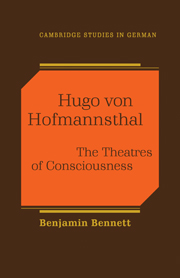Book contents
- Frontmatter
- Contents
- Preface
- Acknowledgments
- List of Abbreviations
- Part I Principles of lyric and drama
- 1 Kleist's puppets
- 2 Language as poetry
- 3 The smallest world theater
- 4 Death and the fools
- 5 Idea, reality and play-acting in Der Tor und der Tod
- 6 Theatrical philosophy: from Der Tor und der Tod to Theater in Versen
- Part II Language and society
- Part III Culture and collapse
- Conclusion
- Notes
- Index of works
- General index
2 - Language as poetry
Published online by Cambridge University Press: 04 August 2010
- Frontmatter
- Contents
- Preface
- Acknowledgments
- List of Abbreviations
- Part I Principles of lyric and drama
- 1 Kleist's puppets
- 2 Language as poetry
- 3 The smallest world theater
- 4 Death and the fools
- 5 Idea, reality and play-acting in Der Tor und der Tod
- 6 Theatrical philosophy: from Der Tor und der Tod to Theater in Versen
- Part II Language and society
- Part III Culture and collapse
- Conclusion
- Notes
- Index of works
- General index
Summary
The question of poetic language in Hofmannsthal is exactly analogous to the question of self-consciousness. Does the language of poetry somehow transcend or supersede our everyday language of conceptual discourse and communication? Again the notion of strict transcendence is rejected, and again, as in the case of conscious or temporal existence, its rejection engenders problems, problems that we can deal with adequately only by shifting our intellectual focus from the individual's linguistic experience to that of the community.
The idea of “magic” is common in discussions of Hofmannsthal's youthful work, for example those of Pestalozzi and Hoppe. And Pestalozzi, working mainly from a speech in Der weiβe Fächer (W3 156; G 225), associates magic with the idea of a “language of life” which is something like what Wolfram Mauser later defines as “the existentially immediate utterance [daseinsunmittelbare Aussage].” This language of life exists only as “spoken” language and bypasses our understanding in order to awaken a sympathetic “resonance” in us (p. 33). In language as we ordinarily use it, the immediacy of life has petrified into a system of concepts; words are “lies,” because the genuineness or pure presence of the “instant,” by being contained in language, is “no longer true” (p. 48). But “poetry finds a way out of the curse of concepts [see G 514]. The poet is a Midas in reverse [A 93], breathing life into things fossilized by conceptual thought” (p. 56).
- Type
- Chapter
- Information
- Hugo von HofmannsthalThe Theaters of Consciousness, pp. 19 - 33Publisher: Cambridge University PressPrint publication year: 1988

